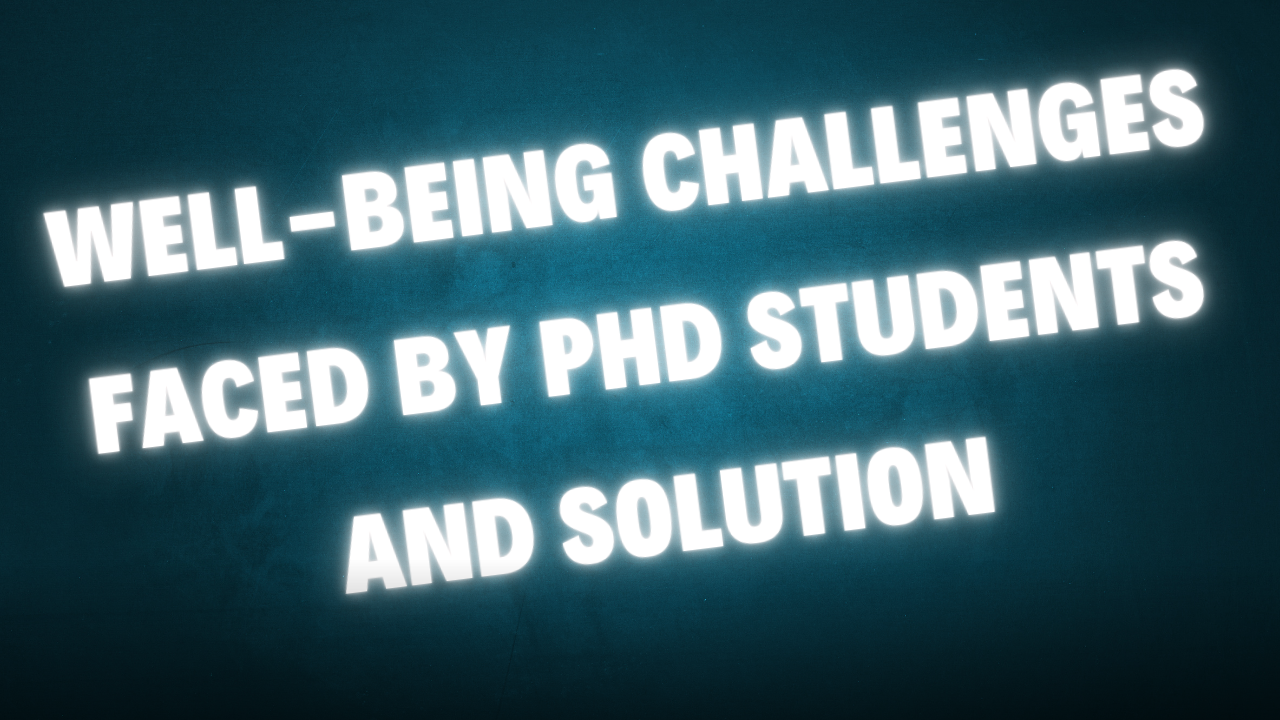Well-Being Challenges Faced by PhD Students and Solution
Kenfra Research - Shallo2025-01-22T17:19:13+05:30Embarking on a PhD journey is a commendable pursuit, filled with intellectual growth and academic achievements. However, the path to earning this coveted degree is not without its challenges. Many PhD students face significant well-being hurdles, highlighting the Challenges Faced by PhD Students that can impact their mental, emotional, and physical health. Let’s delve into the common Challenges Faced by PhD Students and explore strategies to address them.

1. Mental Health Struggles
PhD programs demand intense focus, long hours of study, and often high-stakes deadlines. This pressure can lead to:
- Anxiety and Stress: Balancing research, coursework, and personal life often results in chronic stress.
- Depression: Feelings of isolation and self-doubt (imposter syndrome) are prevalent among PhD scholars.
The constant pressure to produce results, coupled with the unpredictable nature of research, can exacerbate mental health issues. PhD students often feel the weight of expectations, both self-imposed and external.
Solution: Universities can provide counseling services, peer support groups, and mindfulness workshops. Students should prioritize regular mental health check-ins and seek professional help when needed. Building a strong support system among peers can also reduce feelings of isolation.
2. Financial Strain
PhD students often face limited funding and low stipends, leading to financial challenges such as:
- Struggling to cover living expenses.
- Limited resources for research and academic activities.
The financial strain can be particularly daunting for students with families or those pursuing their studies abroad. This stress often detracts from their ability to focus on research and academic goals.
Solution: Institutions should offer transparent funding opportunities, scholarships, and part-time teaching roles. Students can also explore external grants, fellowships, and remote freelance work to supplement their income. Budgeting and financial planning can go a long way in alleviating financial stress.
3. Work-Life Balance Issues
The demanding nature of a PhD program can blur the boundaries between work and personal life, causing:
- Burnout due to excessive workloads.
- Neglect of hobbies, social connections, and self-care.
PhD students often sacrifice personal time and relationships to meet academic deadlines. This imbalance can lead to long-term dissatisfaction and reduced productivity.
Solution: Effective time management is key. Students should allocate specific hours for research, leisure, and self-care. Supervisors should encourage flexible schedules to avoid overwork. Incorporating hobbies and social activities into daily routines can rejuvenate energy and improve focus.
4. Academic Pressure
PhD students often face:
- High expectations from supervisors.
- Competition within academic circles.
- Repeated rejections from journals and conferences.
The journey of academic publishing and presenting at conferences can be overwhelming. Repeated failures and feedback can take a toll on confidence.
Solution: Building resilience and celebrating small wins can help students navigate academic pressures. Mentorship programs and workshops on coping strategies can provide much-needed guidance. Setting realistic goals and embracing the learning process can also reduce stress.
5. Physical Health Neglect
Long hours at a desk and irregular schedules can lead to:
- Poor nutrition and lack of exercise.
- Sleep deprivation.
Physical health often takes a backseat during the demanding years of a PhD, leading to fatigue and decreased productivity.
Solution: Incorporate healthy routines, such as regular exercise, balanced diets, and adequate sleep. Universities can facilitate this by offering gym access, wellness programs, and healthy food options on campus. Simple steps like taking regular breaks, stretching, and staying hydrated can make a significant difference.
6. Isolation and Loneliness
Many PhD students work independently, which can lead to feelings of:
- Social isolation.
- Difficulty connecting with peers.
The solitary nature of research often makes it challenging for students to maintain meaningful social connections, exacerbating feelings of loneliness.
Solution: Engage in collaborative projects, join student organizations, and participate in academic networking events. Virtual communities and online forums can also offer support and a sense of belonging. Organizing regular meetups with peers can foster camaraderie and shared experiences.
7. Uncertainty About the Future
PhD students often face concerns about:
- Career prospects after graduation.
- Limited opportunities in academia versus industry.
This uncertainty can lead to anxiety and hesitation about pursuing long-term goals.
Solution: Career counseling and skills development workshops can provide clarity and direction. Building a diverse skill set and networking within and outside academia can open doors to varied career paths. Students should also explore internships and collaborations to enhance employability.
Final Thoughts
Pursuing a PhD is a challenging yet rewarding experience. By addressing the Challenges Faced by PhD Students, universities and scholars can create a healthier academic environment. Remember, seeking support and prioritizing self-care are not signs of weakness but steps toward success. With the right strategies and resources, Challenges Faced by PhD Students can be effectively managed, allowing them to thrive both academically and personally.
Kenfra Research understands the challenges faced by PhD scholars and offers tailored solutions to support your academic goals. From topic selection to advanced plagiarism checking.










Leave a Reply